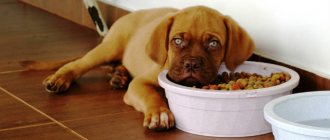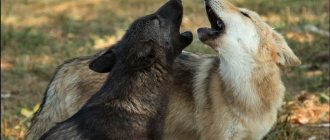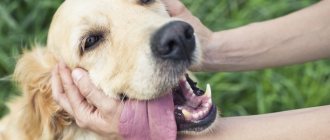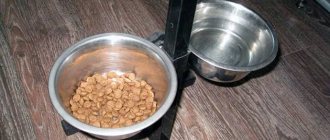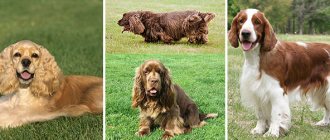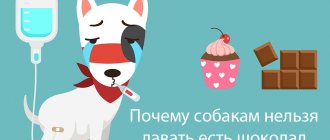Is your dog's gas making you choke? A dog farting may seem funny, but if it happens too often, even dog lovers can't stand it.
If your dog has particularly bad flatulence, it could be a sign of a health problem. Find out why some dogs fart so much and learn how to deal with your dog's flatulence.
Digestion
During the normal digestion process, gases are formed in the intestinal tract. Foul gas is often produced by bacteria in the colon that break down foods that have not been fully digested in the stomach and small intestine.
This can be seen with poor diet (such as ending up in the trash or eating food outdoors). Certain specific foods, such as peas, beans, milk and dairy products, as well as diets very high in meat, can cause bloating in dogs.
Preventing bloating in animals
- Prevention always starts with proper feeding. The quality of food, its quantity, and method of feeding should be taken into account.
- Using tall bowls is not always justified; it is better to simply place the bowl on the floor. It has been proven that with a natural diet, a dog swallows less air.
- Dog food should be balanced: more meat, less grains and legumes. The animal should be fed in small portions. If your dog starts farting, feed it 3-4 times a day in small portions.
- After eating, you should not burden the animal with physical activity. Walking, being a preventive measure against the accumulation of gases, is harmful immediately after eating. Take your pet for a walk before eating.
- Regular prevention of worms (twice a year) will help avoid infection with intestinal parasites that cause the accumulation of gases.
- During a walk, you need to make sure that the dog does not pick up anything from the ground.
If you follow these simple requirements, it is quite possible to protect your pet from pathological bloating.
Medical problems
Infections, diseases and disorders of the gastrointestinal tract can cause excess gas and flatulence in dogs. Some of these conditions are inflammatory bowel disease (IBD), irritable bowel syndrome (IBS), intestinal parasites, tumors, food allergies or intolerances, pancreatitis, and exocrine pancreatic insufficiency (EPI).
Dog treatment
Therapy is based on removing the etiological factor. Correct the dog's feeding - eliminate excess fiber, add foods with a large amount of easily digestible proteins to the diet. These include fermented milk products. The food is enriched with vitamins and microelements.
The daily food intake should be divided into several meals. The dog should receive food in small portions in a calm environment. If the owner has several animals, then their feeding tables should be divided.
It is not the exhaust gases that are dangerous, but the gases that accumulate in the intestines - this complicates digestion and compresses blood vessels and internal organs.
Increased emission of intestinal gases is not dangerous, it is much worse when they accumulate in the intestines and bloat the abdomen. It is necessary to ensure free release of gases. The easiest way is to increase the load. You can release gas by jogging or other physical activity. They use medications that adsorb gases and reduce their formation:
- Activated carbon;
- White clay;
- simethicone;
- magnesia.
The underlying disease must be treated. Enteritis is treated with dietary feeding, a general course of antibiotics, and compensatory therapy. If helminths are detected, forced treatment is carried out - drugs are selected based on the type of worms and the stage of their development.
Care
It's best to make a routine appointment with your veterinarian before attempting to eliminate your dog's gas yourself. Symptoms such as diarrhea and vomiting that occur along with flatulence may indicate gastrointestinal problems or other health problems. You can identify excessive gas during a visit to your veterinarian and see what they recommend.
Treatment of flatulence often involves changing your diet. General recommendations that will help your dog may include a highly digestible, low-fiber diet that doesn't contain too much meat. Special diets and medications may also be prescribed, depending on the veterinarian's diagnosis.
Reasons to contact a veterinarian
Moderate gas production in dogs without a foul odor is normal. If farting is natural and does not have a foul or sour odor, there is no need to contact a veterinarian. The alarm should be sounded when accompanying symptoms appear that indicate flatulence or other manifestations described above. In what cases is the help of a veterinarian necessary:
- prolonged diarrhea and vomiting;
- bloody stool;
- pale mucous membranes;
- labored breathing.
Emergency veterinary care is strictly required in the serious condition of the animal, when signs of gastric volvulus are obvious. This condition requires emergency treatment as volvulus is fatal in most cases. Gastric volvulus is characterized by significant bloating of the abdomen, while gases do not escape. Thus, the accumulated gases put pressure on neighboring organs, blood flow to the organs is interrupted, as a result of which the animal may go into shock. The process is proceeding rapidly. In this case, medical assistance should be provided as soon as possible.
How to prevent flatulence
Passing gas can never be completely eliminated. It's part of life. If your dog is generally healthy and undergoes veterinary checkups, there are a few changes you can make to reduce flatulence:
Exercise with your dog.
This is an easy way to solve your dog's gas problem. Simply walking for 30 minutes after eating can help remove these gases faster, allowing your dog to release them outside where the smell is less noticeable.
Change your dog's diet.
The wrong food can make your dog overly gassy. If you're currently feeding your puppy a low-quality "lean" diet full of questionable ingredients, try switching to a higher-quality, easily digestible diet of whole foods.
If you're already feeding your dog a premium diet, consider switching to a diet that contains a different type of protein. Options designed for dogs with sensitive stomachs are a smart place to start.
Use a strict feeding schedule.
You can feed your dog small meals throughout the day or try placing an obstacle in his food bowl to slow down the rate of consumption. A smaller bowl turned upside down will do. Or consider purchasing a bowl specifically designed for this purpose.
Try probiotics.
Although the benefits of probiotics are debated among professionals, many agree that they can be beneficial. Either way, there's nothing wrong with trying to add more beneficial bacteria to your dog's digestive tract.
Be sure to use a high-quality probiotic that is suitable for dogs and has been proven to be effective. Ask your veterinarian for recommendations.
Consider nutritional supplements. Using Yucca Schidigera and/or zinc acetate may reduce the odor of the gas, but not necessarily its volume or frequency. Activated carbon is also believed to reduce gas odor. Before you start taking any supplements, consult your veterinarian and be sure to choose a product designed for dogs.
Try one diet change at a time. When you change your dog's diet to reduce gas, it's really the only way to determine which change works best. If neither of them works alone, try combining the changes two at a time. If at any time your dog loses his appetite or develops any other symptoms of illness, contact your veterinarian.
Causes of Gas in Dogs
Much like us humans, dogs fart from time to time. This is caused by gas formation in the stomach or intestines. As this gas bubble exits the anus, it may make a sound or produce a foul odor.
And it's no surprise that some dogs experience more flatulence than others. Why? Well, it all comes down to their breed, habits, diet and even their allergies.
Take a look at some of the reasons why your dog may fart more often than others... and when to know if it might be a more serious problem.
© shutterstock
- Some dog breeds tend to fart more often . Although it may seem a little strange, the volume and consistency of the farts may depend on their breed. Brachycephalic dog breeds, such as bulldogs, pugs, boxers, and Boston terriers (dogs with a short/flat muzzle), tend to fart more than others. This is due to the shape of their skull. You see, when brachycephalic dogs eat and drink, they tend to take in more air, which causes gas to build up in the intestines or stomach.
- The dog farts due to bad habits . When it comes to our furry friends, we can all hold our hands up and admit to being guilty of a few bad habits. Sometimes all you need to do is look into your puppy's eyes during dinner and the rest is history. Unfortunately, not all “human” food is good for our dogs. Many of our products are high in fat or made with spices - all of which can upset your dog's stomach. It is best to limit the amount of table scraps as much as possible. Eating off the table is normal, but too much may be the answer to why your dog farts!
- Allergy . When it comes to allergies, they can affect your dog both inside and out. If he suffers from environmental intolerances to pollen, dust or perfume, you will notice that your dog is itching - but what happens when the allergy is internal? An allergic reaction to what they ate can result in a very foul odor. Dairy is one of the leading causes of digestive problems in dogs; loose stools, indigestion, cramps and farting. Unfortunately, it can be difficult to determine the exact cause of your dog's dietary intolerance. Your veterinarian should help you develop a plan to figure out which foods are inappropriate for your puppy if you suspect your dog's farts are due to allergies...
- The dog eats quickly . Lunch time is usually one of your pet’s favorite times of the day—and then “walks!” When they see their food bowl coming, many dogs want to bury their mouths in their delicious dinner... one minute there's food, the next it's gone. Fast food may be the reason why your dog farts. As stated above, brachycephalic breed dogs take in too much air when they eat and drink, so when your puppy eats his lunch too quickly, he may experience a similar effect. How to work around this problem? If your puppy eats very quickly, try a slow-release feeder, which can be purchased at most pet stores. This will split the amount of food they receive at one time and allow the stomach to digest it more slowly.
- Changing your diet . A simple change in your dog's diet could be the reason why he farts. Although it is recommended to change their diet if they are suffering from bad gas, this change may be another factor. If this diet change happens suddenly, your puppy's body will take time to adjust, which may cause farts. It is best to gradually introduce new foods into your puppy's diet. Tip from woofy.dog: If you decide to change your pet's diet for a specific reason, start by gradually adding a new food to his current diet. This will allow your puppy's digestive system to adapt to the new food and reduce any problems.
- Poor quality of food . It can be difficult to know if you are giving your dog the best food for him. There are countless brands and options available, so choosing the perfect diet for your dog can be a daunting task. Many dog food brands on the market contain unnecessary fillers that wreak havoc on your dog's digestive system. Many are carbohydrate-dominant and use corn, soy or wheat to increase the amount of food the dog may be allergic to.
Eating too fast
If your dog tends to eat his dinner quickly, this may be contributing to your dog's flatulence. In fact, the same is true for humans. Why does all this overeating lead to the appearance of buttocks after eating? This phenomenon is called aerophagia, where air enters the stomach while eating or drinking, and is one of the main causes of gas formation.
Try placing a tennis ball in the middle of your dog's plate to slow him down.
Symptoms accompanying flatulence
The accumulation of a large amount of air in the dog’s gastrointestinal tract leads to disruptions in its functioning and causes pain of varying severity. Common symptomatic manifestations of abnormal bowel function include:
- visible increase in volume of the dog’s abdominal cavity;
- excretion of excess through the oral cavity, with parallel hiccups, fetid aromas and attacks of vomiting;
- problems with bowel movements. The animal suffers from constipation or loose stools;
- frequent and loud excretion through the rectum with a sour, putrid or repulsive odor, reminiscent of the decomposition of rotten eggs;
- regular gurgling and rumbling;
- decreased appetite or attempts to refuse food;
- non-standard pose of the pet - constantly hunched over;
- unreasonable anxiety of the dog and search for a comfortable position;
- a sharp decrease in body weight.
Gas formation leads to increased pressure on the intestinal walls with irritation of receptors and pain. When a bolus of food is mixed with gases, foam forms, which covers the internal walls of the organ, causing poor absorption of nutrients. Long-term illness provokes metabolic problems, exhaustion and weight loss in the pet.
The constant presence of a gas mixture in the gastrointestinal tract causes inflammation of the mucous membranes and spasms in the dog. The pathological form of flatulence can become a source of:
- elevated temperature;
- the appearance of particles of blood, pus or mucus in stool and urine.
Important! Some animals may shed eggs and adult parasites in their waste products. Without special therapy, recovery is impossible.
Frequent farting in a puppy
When purchasing puppies from professional nurseries, you need to pay attention to their physical condition. If the baby’s belly is swollen, and upon any palpation he begins to noticeably worry, whine, growl or bite, then the future pet has obvious intestinal dysfunction. In order not to have to deal with its treatment later, it is better to refuse the purchase.
A dog licks its anus under its tail: why does this happen?
Why does a puppy fart often:
- too early weaning;
- incorrect approach to artificial nutrition in the absence of a female or in her illness;
- constant malnutrition of the weaker puppy, which is pushed aside by larger and healthier brothers;
- Lactose intolerance - all dairy products.
If the puppy farts, squeals, shows his anxiety, and his stomach is rumbling and swollen, then he needs a light massage. After a correctly performed procedure, the baby calms down and relaxes. If, in addition to active gas formation, your pet begins to have diarrhea, then he needs to consult a veterinarian. Diarrhea at a young age quickly provokes dehydration and can cause death.
For your information! Miniature dogs of decorative breeds often suffer from similar bloating and weakness. Their anatomical structure provides for a minimal gastrointestinal section. When overfed, they experience various digestive disorders. To avoid these symptoms, when your Yorkie regularly farts after eating, you need to feed him in small portions.
Flatulence in a puppy
Diagnosis of the animal's condition
Before seeking medical help, the owner should observe the dog for several days and write down what it ate, how it behaved and felt, and whether it was influenced by allergens. Based on these records and a study of the medical history, the veterinarian prescribes the necessary tests, which include:
- physical examinations - examination, palpation, tapping, listening;
- laboratory tests of blood (general clinical and biochemical), urine, feces;
- rectal cytology - examination of a smear from the anus;
- Ultrasound of the abdominal organs.
As an additional research method, radiography with a contrast agent may be required to study the condition of individual organs and their functions.
If the allergic nature of the syndrome is suspected, specialized serological studies, tests for trypsin immunoreactivity and antibodies are performed.
Diseases accompanied by the release of gases
Diseases accompanied by the release of gases are very common and numerous, but in most cases they are associated with nutrition and care.
First, you need to make sure that the dog is suffering from flatulence:
- Your dog farts regularly, and the gas may be odorless or cause severe discomfort.
- The dog experiences abdominal discomfort.
- The pet has abdominal distension.
- You notice that your pet's stomach often growls.
With flatulence, the dog may experience associated problems that are expressed by various symptoms.
What foods cause flatulence?
Let's figure out which foods cause flatulence:
- Corn.
- Legumes, especially peas.
- Whole milk and fermented milk products - increased gas formation indicates intolerance or a violation of the intestinal microflora.
- Fat and other high-fat foods.
- Any products with spices.
Approximately 40% of adult dogs are lactose intolerant. In this case, immediately after drinking whole milk, the dog develops severe flatulence and diarrhea. To eliminate unpleasant consequences, whole milk is replaced with homemade fermented milk products.
Increased gas formation from dry food
Increased gas production from dry food is a very common problem. The fact is that feed is divided into classes that indicate quality. The lower the grade of food, the more likely it is to contain legumes, corn, soy and vegetable fats. All these products provoke the development of flatulence and dysbacteriosis.
If increased gas formation begins to bother the dog after switching to dry food, there may be two reasons:
- Inappropriate diet composition.
- Too abrupt a transition to a new diet.
For everyday feeding of dogs, it is recommended to feed at least super premium food that does not contain corn, wheat, peas and other legumes. In addition, the dog may have an individual intolerance to any components of the food. If you are sure that flatulence is associated with dry food, try switching your dog to products from another manufacturer.
The dog's body needs some time to adapt to a different type of food. When switching from natural food to dry food, you need to act progressively. At the first stages, dry food is soaked and mixed with the usual food. After 5-7 days, the dog gradually switches to dry granules. When transferring from one dry food to another, within 3–5 days, the new food is mixed with the usual one.
What to do and how to help your pet
Flatulence is almost always a symptom and therefore cannot be treated as an independent disease. In order to help the dog, it is necessary to determine the root cause and treat it.
To alleviate the condition, dogs use a diet that is easily digestible and contains a small amount of fiber and fat.
If the veterinarian determines that the dog’s condition is chronic, in addition to diet, the pet is prescribed complex therapy. To quickly eliminate discomfort in a dog, special nutritional supplements are used, including those containing probiotics.

